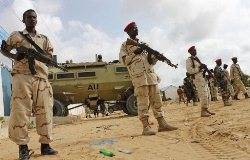Somalia moved one step closer to a new government, with the swearing in of 215 members of the country's committee-selected parliament.
The committee tasked with approving parliamentarians swore in 215 of 275 parliamentarians on Monday afternoon. Another 15 have been approved by the selection committee, but must have had their paperwork approved before they can be sworn in.
The swearing-in ceremony was not quite the historic day that many had hoped for, Al Jazeera's Nazanine Moshiri reported from Mogadishu.
"Ceremony was held in the airport base, which is under the protection of the African Union," she said.
Only when the other 45 members are appointed will the parliament be able to hold crucial votes for speaker and president by secret ballot.
Despite the tardiness, however, there was a mood of new optimism on the streets of the capital.
"This will be the first time in 20 years that an election of this kind will take place in the capital," Moshiri reported.
Hussein Arab Isse, current defense minister and deputy prime minister, said that the delays finalizing the future parliamentarians had been caused by the thorough vetting process.
This was to avoid the scandals of corruption and nepotism that had discredited the previous government, he told Al Jazeera.
"Most people that are coming into the parliament are highly educated and highly motivated," said Isse, who was among those being sworn in on Monday.
"This historic moment marks the long-awaited end of the transitional period in Somalia. The new MPs, selected after broad-based, grass roots consultations and representing all of Somalia's clans, have been successfully screened against objective criteria and are now ready to start their important work," said Augustine Mahiga, the UN representative to Somalia.
Future president
About 24 candidates are running to become Somalia's first post-transition president who, once elected sometime in the near future, will then choose a prime minister.
Many of the candidates for president - including current President Sharif Ahmed, Prime Minister Abdiweli Mohamed Ali and the parliament speaker Sharif Hassan Sheikh Aden - already serve in a government that has been tainted by corruption allegations. Ahmed denied the allegations in an interview with Al Jazeera on Saturday.
Decades of chaos
The Horn of Africa nation has lacked a stable central government since the 1991 overthrow of dictator Siad Barre in 1991, which unleashed a civil war and two decades of chaos.
While the government until recently controlled only a few blocks of Mogadishu, African Union and other troops have since made key territorial gains in their fight against al-Shabab fighters.
With better security, members of the Somali diaspora have returned to invest in their battered homeland, and many now hope that a new government will help the war-torn country stabilize and recover.
In that process, a "technical selection committee" - charged with ratifying new MPs from a list chosen by a group of 135 traditional elders - published the names of the first of 275 new legislators late on Friday.
The committee rejected about 70 nominees because they did not meet the requirements to serve in parliament.
Legislators must be Somali citizens of sound mind, have a high school diploma and be free of ties to warlords or links to atrocities committed during the country's civil war.
The transition process is also laden with inter-clan tensions. Under the agreement, each of Somalia's four main clan families - the Darod, Dir, Hawiye and Rahanweyn - named 30 members to the group of elders nominating the members of parliament.
The remaining 15 were drawn from a coalition of minority groups.
President Ahmed told Al Jazeera that the technical selection committee should not overstep their mandate.
"The technical selection committee was given certain criteria to vet names presented to them. They don't have a right arbitrarily, to choose those on the list and who to reject," he said.
"If there's a problem, members of the technical committee should go back to the council of elders, but it is unacceptable for them to overstep their mandate."
Alexander Rondos, the European Union's special representative to the Horn of Africa, was in Mogadishu on Sunday for an urgent meeting.
"We are in Mogadishu to show support because, finally, this is where the future of Somalia is being decided by Somalis," he said, in statements on behalf of Somalia’s international community partners, including the African Union, the United Nations, the European Union and the Intergovernmental Authority on Development.
"The international community welcomes the important progress that Somalia's leaders and people have made in getting to this stage," he said.
The new parliament - comprising a 275-member lower house and a yet-to-be-launched upper house with a maximum of 54 members - is tasked with electing the president, the speaker and two deputy speakers.
It will be allowed to go ahead with voting on Monday if a quorum of more than two-thirds of the lower house - 184 members - is present.
The new president will then appoint a prime minister, who in turn will form a council of ministers.
PHOTO CAPTION
Somali soldiers stand guard during a visit of Somalia's President Sharif Sheikh Ahmed to Afgoye on July 30, 2012.
Al-Jazeera


 Home
Home Discover Islam
Discover Islam Quran Recitations
Quran Recitations Lectures
Lectures
 Fatwa
Fatwa Articles
Articles Fiqh
Fiqh E-Books
E-Books Boys & Girls
Boys & Girls  Articles
Articles










